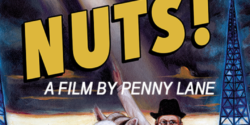I am so looking forward to Penny Lane’s new documentary on John Romulus Brinkley, coming here to San Francisco in early July. Titled Nuts! it chronicles “Doctor” Brinkley’s rise as the Depression era midwestern mega-quack who championed the grafting of goat glands into the gonads of his patients. To promulgate this astoundingly bad cure for male sexual impotence, Brinkley launched several radio stations. First came KFKB broadcasting out of Milford, Kansas. When the government shut that operation down, the goateed grifter migrated his hideous medical hoax to Del Rio, Texas, promoted by a one million watt radio station located just across the United States/Mexico border.
Whenever I get a chance to teach my history of radio class, Brinkley is always wicked fun to talk about. He was, after all, one of the great “border blaster” radio pioneers, leading up to Wolfman Jack and other legends. The narrative is so rich that one is tempted to forgive him for stitching billie parts into the family jewels of hapless dupes who really needed to be treated for prostate cancer or venereal disease.
But his legacy includes at least one positive point. When the Federal Radio Commission (precursor to the Federal Communications Commission) nuked his license, they did not do so just because the guy was pure snake oil. The problem, the FRC contended, was that KFKB existed entirely to promote Brinkley’s mail order pharmaceutical operation and “cures.”
An appeals court backed this argument up in 1931 in KFKB Broadcasting versus the Federal Radio Commission. When Congress set up the FRC as a licensing authority, the court opined, “it very evidently had in mind that broadcasting should not be a mere adjunct of a particular business but should be of a public character.” In this case, the Court of Appeals of the District of Columbia agreed with the government’s contention that KFKB’s programs were “conducted only in the personal interest of Dr. John R. Brinkley.”
That wasn’t good enough, the FRC insisted. Broadcasters fortunate enough to receive radio licenses couldn’t just turn them into glorified ATM machines. They had to adhere to a general standard summarized as “the public interest, convenience, or necessity.” They had to offer content of value to a broad spectrum of people in their respective broadcast areas, not just news about themselves that could be quickly converted into cash.
That ruling was important then; it is still important now. Thank you, “Dr.” Brinkley, for inadvertently helping to make it happen.



